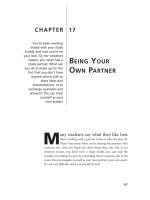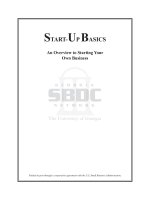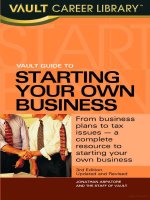Three Myths About Starting Your Own Business
Bạn đang xem bản rút gọn của tài liệu. Xem và tải ngay bản đầy đủ của tài liệu tại đây (42.21 KB, 3 trang )
Three Myths About Starting Your Own Business
Mistakes that hurt countless would-be entrepreneurs.
Many people dream of shedding the corporate life and starting their own companies.
They imagine creating the next Google or Apple. From Steve Jobs to Bill Gates to
Pierre Omidyar, many of the world's richest people on the Forbes Billionaires List
started as entrepreneurs, so it's little wonder so many believe that's the path to wealth
and happiness. But getting a company going is hard and takes sacrifices, especially in
this down market. More than 50% of companies fail in their first five years. Their
founders spend much of that time skipping vacations and luxuries and sometimes even
meals.
I've started three businesses, and I've invested in others as an angel investor and
venture capitalist. I've often struggled and failed. My second start-up made $7,000 over
three years while I lived in a $200-a-month apartment. With another one I gained 25
pounds during the first year, thanks to too many hurried dashes to McDonald's. But I'm
glad I chose the entrepreneurial path. I like the challenge of creating something from
scratch.
I've learned a lot from my experiences. Before you venture out on your own, I offer you
three myths about starting a business that I wish I had known before I began.
The first myth is that you should spend a lot of time preparing detailed business plans.
Many business school professors and consultants recommend writing them with lots of
scenario planning and financial projections. Far too many entrepreneurs lock
themselves up for six months to labor away creating the perfect plan. The problem is
that markets change so quickly that you don't really know how consumers will view your
product. Those six months would be better spent better developing a product and trying
to sell it.
What has always worked for me is to write five to ten bullet points listing what I hope to
accomplish and several back-of-the-envelope financial projections. Be realistic in your
revenue projections. Too many entrepreneurs predict that their companies selling
plastic flowers or whatever will hit Google-like profit levels within five years. But how
many companies ever become the next Google ( GOOG - news - people )? Be realistic
in your projections.
Instead of writing a detailed plan with unrealistic projections, focus on figuring out
those five or ten points and then get moving actually building a company. Every three
months, look at those bullet points and see if you need to add to or change them. A
business plan should serve as a guide, not a bible. Naturally businesses need to evolve
to take into account changing market conditions.
The second myth is that as an entrepreneur you have to develop the coolest, most
innovative product. Instead you should ask yourself, will anyone actually buy my
product?
Entrepreneurs are often dreamers and inventors. Many get so caught up in the coolness
of their products that they forget they need see if anyone will actually pay money for
them. Take for example the Segway. It generated lots of buzz when it first hit the
market. Who can forget President Bush falling off one in 2003? The Segway is a cool
concept, but the market for it just isn't big enough to sustain real growth. Outside of
large warehouses and airports, nobody needs it, yet the costs of producing it are huge.
What you do need to do is get your product to market as soon as possible, to start
generating revenue and gain customer feedback. All companies, large or small, need to
be more customer-oriented than engineer-oriented. You have to take into account
customer wants and develop products based on that feedback.
Sales cycles for start-ups are far longer than most entrepreneurs expect. Estimate how
long it will take to get to your first sale--and then multiply that times five. Don't get
caught up in perfecting your product beforehand. Too many entrepreneurs so endlessly
improve their products before starting to sell that by the time they finally feel ready to
knock on doors, they've run out of capital and have to shut down.
Get a workable product out the door and fix the bugs as you go along. That way you also
get valuable feedback about its strengths and weaknesses, for the market doesn't likely
agree with you about what's perfect.
In many ways the quality of your execution is more important than the innovativeness of
your product. Microsoft ( MSFT - news - people ) is a great example of this. They have
executed beautifully and established great sales channels, even if most of their products
are weak compared with competitors. Does anyone truly prefer Internet Explorer to
Firefox or Chrome?
The third myth is that you can fob off difficult and unwanted work on lieutenants. I hear
this one all the time. People think being the boss means you can leave work early or
take long vacations. In reality the opposite is true. Entrepreneurs can never really get
away. You are always thinking about closing that next deal, raising money from
investors or dealing with regulatory work.
Moreover, especially in a start-up, the boss needs to set the work culture. I am a
believer that the entrepreneur has to be the first person into the office and the last one
to leave. If you're asking your team to sacrifice and work extra hours or stay at a Motel
6 rather than the Ritz-Carlton, you need to be there right next to them. I start work at 5
a.m. every day. When I ask my team to work a little late or on a weekend, I'm there too.
For years my current business didn't have a cleaning person. We did it ourselves, every
Friday night, with the most junior person choosing first what chore to have. As the boss,
I usually got stuck with the job no one wanted.
Setting up your own company is an exciting adventure, but it's never easy. To become
the next Sergey Brin or Larry Page, or even just to realize the dream of creating your
own healthy business, focus your time and energy on getting that business going rather
than on crafting a plan for it that will be outdated by the time you complete it. And once
you've started, remember that it's not necessarily the most innovative product that sells,
it's the one customers want and can easily get. Finally, expect to work longer and harder
than those around you. Do all these things, and you may have a real shot at establishing
a successful organization that can stand the test of time.
Source: />Mọi người cùng đọc và dịch nhé. Nếu chúng ta chịu khó dịch sang tiếng Việt và nhờ mọi người
đọc rồi sửa theo mạch văn tiếng Việt thì hi vọng sẽ nâng trình trong việc dịch Anh-Việt









